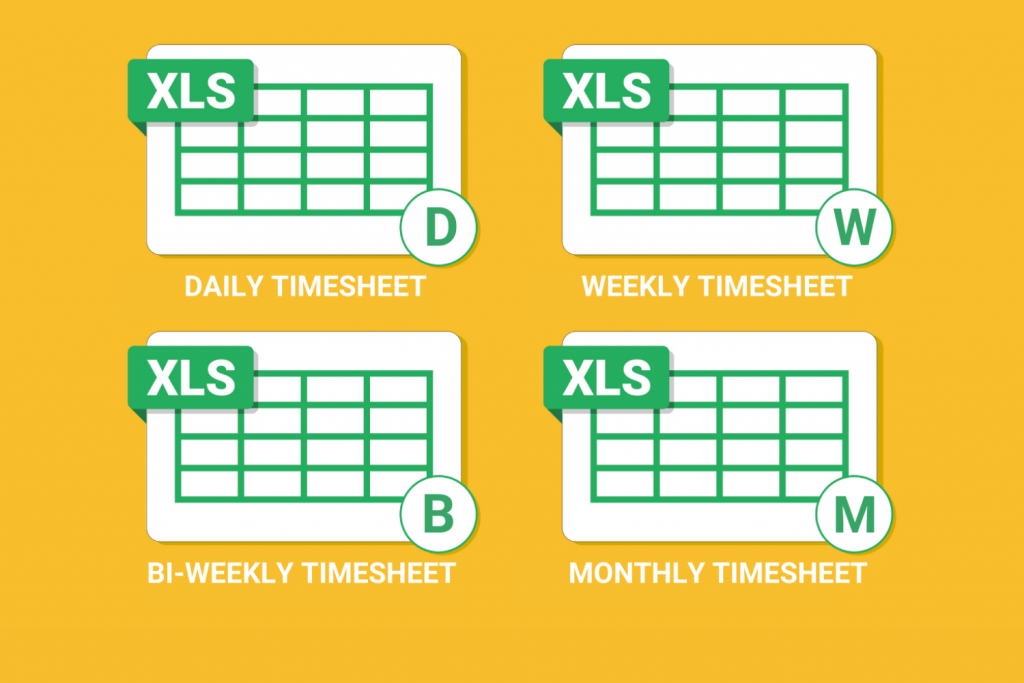
According to data from Research and Markets, the global construction industry market size is expected to reach $10.5 trillion by 2024. Despite the economic challenges during the pandemic, the industry keeps growing. In the U.S., for instance, over 10 million people are registered as construction employees. With more individuals working in this industry, construction timesheet templates have become an important tool in business operations.
A timesheet is important for tracking work hours and calculating payroll. It is perfect for construction contractors and employees who usually have flexible schedules.
“Designed to simplify time tracking and project management, these templates are customizable to suit your specific needs. With Traqq’s insights, discover how these timesheets can help you accurately monitor hours worked, track project progress, and ensure timely completion of tasks.”
Now, when you use a construction timesheet template, you’ll make the process of tracking time and operational costs a lot easier.
What Is a Construction Timesheet?
Using a construction timesheet template allows you to record the working hours of employees and contractors. It also provides you with the data you need to calculate payroll for a given time.
Construction timesheets are a bit different from traditional timesheets for the following reasons:
A construction timesheet usually requires users to record the start and end times of their activities instead of indicating the exact number of work hours.
Construction timesheets have customizable work structures. After all, the traditional Customer/Project/Task arrangements are not applicable to the nature of the industry.
Instead of using traditional task names, construction timesheet templates have cost codes.
Work and billing rates are what determine the structure of a construction template. While traditional projects use productivity as a key metric, construction businesses are more focused on profitability. Naturally, construction timesheets are designed around computations of profits and costs.
4 FREE Construction Timesheet Templates
Here are some of the best timesheet templates you can use for construction projects:
1. Weekly Construction Timesheet
You can use cost codes and project names to track work hours with this weekly construction timesheet template. The data you collect using this timesheet can also be used to break down your labor and project costs. This way, you can easily compare your actual expenses vs. your budget.
This weekly construction timesheet template lets you record the date, cost code, project, start time, and end time. Also, there’s a section for inputting extra costs such as fuel and mileage expenses.
Get your FREE monthly timesheet with overtime tracking for Google Sheets.
2. Weekly Construction Timesheet for Contractors
Do you work with contractors? Perhaps, you’re more focused on paying for logged hours instead of looking at the start and end times of the workers. If so, then this weekly construction timesheet template for contractors is what you need.
This timesheet template lets you record the rates for every activity. This data can be helpful if you have varying rates for each task.
There’s also a section for inputting extra expenses like fuel and mileage costs.
For similar timesheet examples, check out our free weekly timesheet templates.
Get your FREE monthly timesheet with overtime tracking for Google Sheets.
3. Daily Construction Timesheet
Now, if you want to get a detailed breakdown of activities for each day, this daily construction timesheet template is what you need.
Aside from recording start and end times, this timesheet also lets you indicate the cost code, project, and the quantity of the activities.
There’s also a section for additional expenses like fuel and mileage costs.
Get your FREE monthly timesheet with overtime tracking for Google Sheets.
4. Daily Construction Activity Timesheet
If you want to record key events or activities happening on a construction site, you can use this timesheet template. It is a simple daily report that lets you write down progress notes, weather, and other important events.
This timesheet also allows you to record all present subcontractors and workers, including the number of hours they were on site. You can also indicate key call outs like delays and safety issues.
Get your FREE monthly timesheet with overtime tracking for Google Sheets.
If you prefer tracking time every day, check out our free daily timesheet templates.
What Are the Pros of Using a Construction Timesheet Template?
Like other forms of timekeeping, construction timesheets have advantages and disadvantages. Here are some of the pros of using a construction timesheet template:
Manage Payroll with Ease
Construction timesheets help you pay your workers for the total hours they’ve logged. However, you can also use the data to bill your clients.
Let’s say you’re a contractor who’s hiring construction workers on a daily, weekly, or monthly basis. In this case, you can use the data from the timesheet to compute the total time you’ve spent on a specific construction project. You can then use the data to send an accurate invoice to bill your client for the work done.
Manage Projects Efficiently
A McKinsey report revealed that 77% of construction megaprojects around the world are behind schedule by 40% or more. After all, some sites usually handle several people and projects simultaneously. Of course, keeping tabs on construction activities and workers can be quite difficult.
If you’re supervising a group of construction employees, the process can be tricky. You need to walk around a humongous site and check on the progress of each task.
With a construction timesheet template, you can get accurate details about what’s happening around the site. You can use the data to gauge the progress of a project and monitor worker performance.
By understanding what everyone is working on, you will be able to identify what activities are eating up too much time. As a result, you can address problem areas that may be slowing down the entire project.
What Are the Disadvantages of Using a Construction Timesheet
Timesheets have made payroll processing easier. However, they are not without problems too. Here are some of the disadvantages of using a construction timesheet template:
Inaccurate Data
Timesheets have to be accurate to ensure that you’re paying construction workers correctly. Unfortunately, research shows that almost 90% of spreadsheets have errors. So, if you’re using Excel for your construction timesheet, there’s a big chance that the data that was manually entered is inaccurate.
No matter how honest your employees are, there is still room for human error during documentation. Of course, this can lead to incorrect client billing and worker payments.
No Productivity Metrics
Progress and productivity are not measured solely on the number of hours worked. If you want to get a clear view of productivity, you need to know where those minutes went.
A construction timesheet on a spreadsheet will only show you how many hours your employees worked. It will not indicate the progress your team made on a construction site.
So, using a construction time sheet template may not provide you with the data you need to determine productivity and progress.
Tedious Process
Indeed, timesheets let you record the number of hours worked. However, the process can still be quite tedious because everyone has to manually input their data. Then, you need to collate the data and calculate everything for every pay period.
Because the process is not automated, you can expect a lot of extra work.
Now, if you’re managing several contractors and workers, you’ll also spend a lot of time checking individual timesheets. Of course, you can hire another person to handle payroll. However, that will be added to your business expenses.
Are Construction Timesheets Still Relevant?
In the 19th century, construction timesheets were referred to as ‘time books’. Workers used the books for maintaining records of their hours. These books would be managed by timekeepers, foremen, and clerks.
Time books from that time are a lot similar to the timesheets used in construction sites today. In fact, to this day, some construction workers still use similar notepads. Foremen would still have to sign the timesheets off on site.
Of course, construction timesheet templates have gone a long way from the simple pen and paper that the industry used over a century ago. These days, companies can use templates to analyze expenses and costing structures. They also use the data to understand return on investment and resource allocation.
While there’s a lot of progress in the industry, many continue using spreadsheets for their timesheets. Of course, this can be time-consuming and inaccurate. In fact, a McKinsey report revealed that $1.63 could be saved every year when companies invest in infrastructure productivity changes.
One of the ways that construction companies can improve payroll and productivity management is by automating time tracking. Consider using Traqq to make the entire process easier and more effective. With this tool, you can automatically calculate work hours and monitor productivity.
What Is Traqq?
Traqq is a user-friendly and lightweight employee productivity app. Companies of all sizes can use it to simplify payroll management and worker supervision.
Here’s how Traqq can overcome the limitations of tracking time with a spreadsheet:
Optimized Time Tracking
When you use a construction timesheet, you’re relying on manual data entry. As we’ve mentioned, using spreadsheets can lead to data inaccuracies.
You can address this issue by automating time tracking and productivity monitoring with Traqq. The entire process can be inaccurate and more efficient. Contractors and workers can easily record the time they spend on any construction activity with this tool.
How can this be done?
Once Traqq starts running, it will automatically record work hours. Contractors can focus on their work instead of constantly filling out timesheets.
If they step out to take a break, they can stop the timer. Traqq will only record the time when the employee voluntarily switches the tracker on.
Accurate Timesheet and Productivity Reports
Do you have construction employees who primarily perform admin tasks? If so, you can monitor their productivity with Traqq.
Traqq allows you to generate neat, online timesheets that include various metrics for productivity. For one, you can see how active they are based on their keyboard movements and mouse clicks and scrolls.
What’s more, Traqq shows you the top websites and apps that employees use. So, you’ll easily determine whether the time you’re paying goes to productive work.
Easier Payroll Management
You don’t have to rely on Excel for managing your payroll records. With Traqq, you won’t have to create complex formulas and templates to compute salary.
Traqq lets you collect the time data you need to easily generate payroll invoices. With this app you can:
- Indicate the payment rate for each contractor or employee
- Generate timesheets for individual workers or entire teams
- Export timesheets as CSV or PDF files
- Schedule timesheet reports and send them to specific email addresses
In Conclusion
Using a time tracker not only lets you record your construction team’s work hours. It also allows you to pay your employees fairly and monitor their productivity.
While our free construction timesheet templates can speed up the process, you’ll still have to deal with manual data entry. Of course, this can be time-consuming if you’re managing a massive team.
So, if you want a more effective way to process payroll and monitor productivity, use Traqq. By ensuring accurate data and boosting efficiency, you can also improve profitability.


